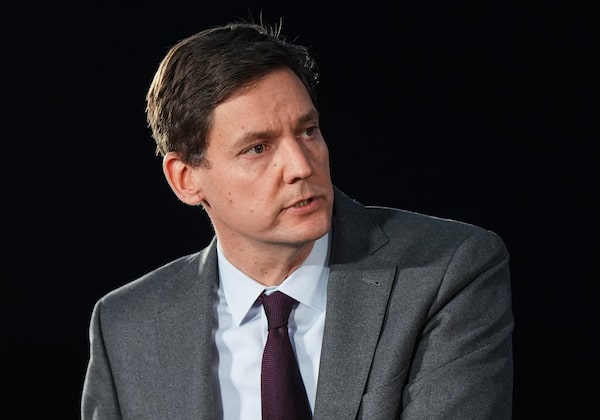
B.C. Premier David Eby announced Sunday that the province would table 'unexplained wealth order' legislation in the spring, as one piece of a broader public safety plan.DARRYL DYCK/The Canadian Press
British Columbia is set to introduce legislation that will make it easier for the state to seize property from individuals who have not been charged or convicted of a crime, in what a provincial civil liberties watchdog is calling an “unacceptable infringement” of Canadians’ Charter rights.
Premier David Eby announced Sunday that the province would table “unexplained wealth order” legislation in the spring, as one piece of a broader public safety plan. Purportedly aimed at high-level, predatory criminal organizations and individuals, the legislation would allow the government to seize assets from individuals who cannot sufficiently prove their source of wealth.
“I think that for many British Columbians, it’s very frustrating to hear police say this individual is known to police, we have reason to believe this individual is involved in organized crime, they’re driving around in luxury SUVs with secret compartments where they hide weapons, they live in fancy homes, they have fancy jewellery and luxury goods, with no apparent source of income,” Mr. Eby said.
“And when we look at that situation, coupled with the report, the public inquiry into money laundering that says that we have a multibillion-dollar problem with money laundering in our province, action needs to be taken.”
Peter German, former deputy commissioner of the RCMP, and Austin Cullen, commissioner of a public inquiry into money laundering, found that billions of dollars of criminal funds flowed annually through casinos, real estate and luxury goods in the absence of effective law enforcement. Both recommended the introduction of unexplained wealth orders, or UWOs.
Mr. Eby acknowledged the UWO legislation would be a Canadian first, and said he had “no doubt” it would be challenged it court. “But, I believe we will be successful, and we need to address these issues for British Columbians.”
The BC Civil Liberties Association, of which Mr. Eby was executive director from 2008 to 2012, is staunchly against such legislation, saying it has no place in Canadian law.
“The BCCLA believes that UWOs are an unnecessary expansion of government power and an unacceptable infringement of Canadians’ rights to the presumption of innocence, due process and privacy,” the association said in a statement.
There are currently several mechanisms under which the province can seize assets believed to be the proceeds of crime. Under criminal forfeiture, a person is typically convicted of a crime, having been found guilty beyond a reasonable doubt. Civil forfeiture removes the requirement for a charge or conviction, allowing the state to seize property if the director of civil forfeiture shows it is more likely than not to be proceeds of unlawful activity.
Administrative forfeiture makes it even easier for authorities to seize property under $75,000. B.C.’s Civil Forfeiture Office must notify the property’s owner by sending a letter to the owner’s last-known address, or publishing a notice in the newspaper. If the owner does not respond within two months, the property – such as a vehicle, cash, or a mobile phone – is forfeited. If the owner chooses to contest the seizure within two months, the case goes to court.
Nearly all forfeiture cases in British Columbia settle in the province’s favour. Because the cost to retain a lawyer can exceed the value of the property seized, many people are unable, or unmotivated, to pursue legal action.
Stephen Chin, staff counsel for the BCCLA, said it is of the association’s view that a civil forfeiture regime primarily targets a specific piece of property, while UWOs further expand government powers and essentially target a person’s wealth writ large, engaging Section 11 of the Charter: the right to be presumed innocent until proven guilty.
Compelling a person to provide private financial information without reasonable and probable grounds may also engage Section 8 of the Charter, which protects against unreasonable search or seizure and has been interpreted through case law as a shield against unjustified state intrusions on personal privacy. He emphasized that UWOs should be considered not in isolation, but in a broader context that includes an already problematic forfeiture scheme and the erosion of privacy and due process rights.
“There’s always a balance to be had between crime prevention and upholding our constitutionally protected rights, and in our view, this regime undeniably upsets that balance and should be viewed with great caution,” Mr. Chin said in an interview.
“In our view, it is not in accordance with Canadian law, and not in accordance with the constitutional safeguards that already exist. It represents a whole host of impermissible erosion in due process and privacy, and the reversal of presumption of innocence. That should be very concerning to Canadians that that is the proposal that’s being considered.”
Bibhas Vaze, a Vancouver-based lawyer who specializes in civil forfeiture, said the mechanism as it exists is already overly expansive.
“You’ve got this thing, which is pretty draconian itself, and now [the proposed legislation] suggests the people who are putting things in place don’t think it’s draconian enough, which is something particularly dangerous and something that should be particularly concerning to the people of British Columbia,” he said.
However, Mr. Vaze said the government has the opportunity to craft the legislation with appropriate safeguards that would uphold due process, respect the rule of law and protect vulnerable people.
“For example, if before laying an order a court must be satisfied that the investigation that preceded making the order did not in any way violate the Charter rights of the owner of the property – they could think about implementing things like that,” he said.
“But if the whole point is to actually sidestep the Charter – because it’s too complicated, it’s too damn hard – then they’re not going to be thinking about those checks and balances.”
 Andrea Woo
Andrea Woo